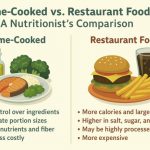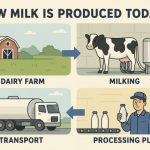Dairy products can be an excellent source of protein, calcium, probiotics, and essential vitamins—but not all are equally beneficial or well-tolerated. From milk to cheese and yogurt, the nutritional profile of dairy depends on processing methods, fat content, fermentation, and additives. Let’s explore which dairy options are healthiest and safest for regular consumption, especially when chosen wisely.
Why Choose Dairy?
When tolerated well, dairy provides:
- High-quality protein (complete amino acid profile)
- Calcium and phosphorus for bone health
- Vitamin B12, which is essential for nervous system function
- Riboflavin and potassium
- Probiotics (in fermented products like yogurt and kefir)
However, some people are lactose intolerant or sensitive to certain proteins in milk, which can affect digestion and tolerance.
Top 5 Healthy and Safe Dairy Products
1. Plain Kefir
- A fermented milk drink rich in probiotics.
- Contains less lactose than milk, making it easier to digest.
- Supports gut health, immune function, and digestion.
- Choose unsweetened, low-fat versions for best benefits.
Best for: gut health, post-antibiotic recovery, immune support
2. Natural Yogurt (No Sugar Added)
- High in protein and live cultures.
- Supports bone density and digestive balance.
- Greek yogurt is particularly rich in protein and low in lactose.
- Watch for added sugars, flavors, or artificial thickeners.
Best for: daily snack, protein boost, balanced breakfast
3. Aged Hard Cheeses (Parmesan, Swiss, Cheddar)
- Naturally low in lactose due to aging.
- Concentrated source of calcium and vitamin K2.
- Longer shelf life and easier to portion.
- Choose low-sodium, unprocessed options.
Best for: people with mild lactose intolerance, bone health
4. Cottage Cheese (Low-Fat or 2%)
- High in casein protein—slow digesting and great for satiety.
- Contains vitamin B12, selenium, and phosphorus.
- Easy to mix with fruits, vegetables, or eggs.
- Avoid flavored varieties with added sugar or sodium.
Best for: weight control, muscle support, high-protein meals
5. Butter from Grass-Fed Milk (in moderation)
- Contains butyrate, conjugated linoleic acid (CLA), and vitamin A.
- Small amounts can be part of a healthy fat profile.
- Avoid excessive use and opt for minimally processed varieties.
Best for: occasional use in cooking or baking
Less Healthy or Risky Dairy Products
- Flavored yogurts and milk drinks: Often loaded with added sugar.
- Processed cheese slices and spreads: Low in real cheese, high in additives and sodium.
- Condensed and evaporated milk: High in sugar and low in nutrient density.
- Ice cream and cream cheese: High in fat and sugar, best enjoyed sparingly.
Tips for Choosing Safe and Beneficial Dairy
- Read the label: Choose items with few ingredients and no added sugars.
- Watch portion sizes, especially for high-fat cheeses and creams.
- Organic and pasture-raised options may offer better fatty acid profiles.
- If lactose intolerant, look for lactose-free versions or fermented products.
Always remember that the most natural dairy product is the milk that the cow gives.
Glossary
- Lactose — A natural sugar found in milk that some people cannot digest well.
- Probiotics — Beneficial bacteria that support gut and immune health.
- Casein — A slow-digesting milk protein found in cheese and cottage cheese.
- CLA (Conjugated Linoleic Acid) — A fatty acid in grass-fed dairy with possible anti-inflammatory effects.
- Vitamin K2 — A vitamin important for calcium metabolism and heart health.


